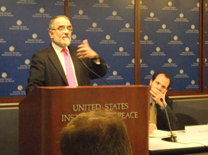Prospects for Peace in Afghanistan: An Insider's Perspective
USIP hosted a discussion about prospects for peace in Afghanistan with renowned journalist Ahmed Rashid. Having spent the past three decades reporting from Afghanistan, Pakistan and Central Asia, Ahmed Rashid offered an insiders perspective on the prospects for political negotiations with the Taliban and other insurgent groups, and for sustainable peace in Afghanistan.
 USIP hosted a discussion about prospects for peace in Afghanistan with renowned journalist Ahmed Rashid. Having spent the past three decades reporting from Afghanistan, Pakistan and Central Asia, Ahmed Rashid offered an insider's perspective on the prospects for political negotiations with the Taliban and other insurgent groups, and for sustainable peace in Afghanistan. Rashid examined a myriad of factors contributing to Afghanistan’s instability, including the external influence of Afghanistan’s neighbors, and focused particularly on the role and interests of Pakistan, and how to interpret recent moves such as the arrest of high-ranking Afghan Taliban in Pakistan. He also lent insight into the Taliban’s perspective and negotiating style.
USIP hosted a discussion about prospects for peace in Afghanistan with renowned journalist Ahmed Rashid. Having spent the past three decades reporting from Afghanistan, Pakistan and Central Asia, Ahmed Rashid offered an insider's perspective on the prospects for political negotiations with the Taliban and other insurgent groups, and for sustainable peace in Afghanistan. Rashid examined a myriad of factors contributing to Afghanistan’s instability, including the external influence of Afghanistan’s neighbors, and focused particularly on the role and interests of Pakistan, and how to interpret recent moves such as the arrest of high-ranking Afghan Taliban in Pakistan. He also lent insight into the Taliban’s perspective and negotiating style.
This event also marked the 10th anniversary and the release of a new edition of Rashid’s international best-seller, "Taliban: Militant Islam, Oil and Fundamentalism in Central Asia."
Speakers
- Ahmed Rashid
Author of "Descent into Chaos" and "Taliban: Militant Islam, Oil, and Fundamentalism in Central Asia." - Steve Coll
President, New America Foundation - Elizabeth Rubin
Contributing writer to The New York Times
Edward R. Murrow Press Fellow, Council on Foreign Relations - J Alexander Thier
Director for Afghanistan and Pakistan, U.S. Institute of Peace



